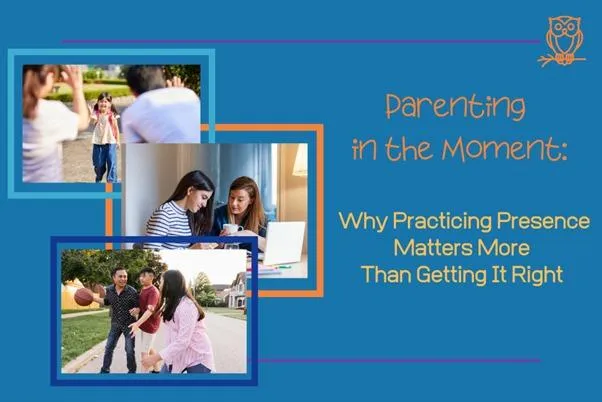
Parenting in the Moment: Why Practicing Presence Matters More Than Getting It Right
Presence is More Than Being in the Room
Many of us were raised to believe that being there physically was enough. A parent in the room, a meal on the table, a roof overhead — those were the markers of presence.
But children need more than proximity. They need us to notice them, to attune to their emotional world, and to bring a grounded energy into the moment. Presence means showing up with our whole self — aware of what’s happening in us and in them.
It’s Noticing
Have you ever caught yourself nodding along to your child’s story — while your mind was already racing ahead to dinner, the mess in the kitchen, or tomorrow’s to-do list?
You’re not alone. Parenting can feel like one long balancing act, and our attention is pulled in a thousand directions. But here’s the truth: when it comes to our child’s emotional world, presence is more powerful than perfection.
Presence builds attachment
Children don’t need us to have all the answers. What they need most is to feel seen, heard, and valued in the moment. That’s what lays down the foundation of secure attachment — the sense of “I matter, I belong, I am safe.”
When we are distracted, dismissive, or quick to problem-solve, our child can experience the opposite message: “My feelings don’t matter,” or “I have to manage this on my own.” Over time, that can chip away at trust.
Why presence is hard
Many of us were raised to “just get on with it,” so slowing down to tune into our child’s needs may not come naturally. Add in the realities of neurodivergence — in us or our kids — and moments of chaos can easily hijack our ability to be calm and grounded.
With all our heart we can be enabling their lives in a way we believe they need. We take them to sport we discuss their interests and yet how we deliver our support may not always connect to their needs in how they best receive our efforts.
It’s appreciating presence isn’t about sitting cross-legged for hours in meditation. It’s also not what you are “doing” for or with them. It’s about micro-moments of connection:
Pausing before reacting.
Getting curious about what your child’s behaviour is telling you.
Making eye contact, even for a few seconds, to show “I’m with you.”
As the parent of now adults, amongst the feedback I have received was how they processed how I as “in attendance” though not always “present”. That was an uncomfortable insight about their experience of being raised by my quite different personal needs.
Our responsibility as an adult is to have awareness of the potential conflicts and do our best to mitigate those. It’s not about feeling guilt (or shame), it’s accepting our imperfections that our child needs to support to know that they weren’t the problem. (Because they weren’t, it was our mismatched behaviour. Instead of being defensive, we can always empathise with their experience and empower them to know that our choices were not an indication of our lack of care).
A practical pause
Next time you feel the frustration rising, try this:
Pause.
Take one breath.
Ask yourself, “What matters most right now — control, or connection?”
That tiny pause creates a window for you to respond with presence instead of reactivity. And that choice, repeated over time, is what helps your child grow into a resilient, securely attached adult.
You don’t have to do it perfectly
Presence is a practice, not a performance. You’ll miss it sometimes — I still do. But every time you notice, and come back to the moment, you’re showing your child what it looks like to be human, to repair, and to reconnect.
One great question you may also consider, to practice awareness is “for what purpose am I doing this, right now”. For those of us with slippery brakes, we can have a tendency to lose track of time, making presence challenging. This little question can bring us back on track.
In Closing
If you’re ready to discover more ways to bring calm, connection, and presence into your parenting, join me for my upcoming Transforming Attachment Webinar.
Interested? Click here to add your name to the waitlist.
Together we’ll explore the small shifts that make the biggest difference in building secure, resilient bonds with your child.